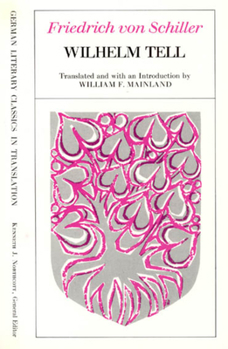Wilhelm Tell
Select Format
Select Condition 
Book Overview
When Schiller completed Wilhelm Tell as a "New Year's Gift for 1805" he foretold that it would cause a stir. He was right. In the midst of Great Power politics a play which drew substance from one of the fourteenth-century liberation movements proved both attractive and inflammatory. Since then the work as become immensely popular. This new English translation by William F. Mainland brings out the essential tragi-comic nature of Wilhelm Tell but also...
Format:Paperback
Language:English
ISBN:0226738019
ISBN13:9780226738017
Release Date:May 1973
Publisher:University of Chicago Press
Length:190 Pages
Weight:1.35 lbs.
Dimensions:0.4" x 5.3" x 8.1"
Customer Reviews
3 ratings
Interesting
Published by Thriftbooks.com User , 19 years ago
This was apparently Schiller's most popular work during the 19th century with many, many performances in Germany in the century after his death. In the form of Rossini's famous opera, it probably reached an even wider audience. To modern audiences, however, this play has less appeal. Schiller's celebration of romantic nationalism and ethnic solidarity seems almost cliched. This is not a criticism of Schiller's writing but a reflection of the extent to which nationalist assumptions have penetrated our culture. Its difficult to look at this play in the way that 19th century audiences in a Germany still fragmented on the basis of feudal political structures must have seen it. At the same time, Schiller was able to appeal to Liberal, reformist traditions by stressing the importance of individual freedom and dignity. The stagecraft of this play is impressive and Schiller includes enough psychological detail to prevent the characters from being stick figures. The dialogue is not Schiller's best work and some parts come across as bombastic. Well worth reading but this work will be of most interest to those interested in Schiller, German literature, or 19th century European history.
An immortal tale about freedom
Published by Thriftbooks.com User , 24 years ago
In this book, Schiller takes the old legend of Wilhelm Tell and gives it the shape and structure of a novel. It is a wonderful tale about Tell, a mountain man who is very angry at the despotic and cruel ways in which Gessler, the representative of the hated Austrians, treats the peaceful Swiss people. Tell refuses to give in to Gessler's mischievous way, suffers a lot (remember that he has to shoot an arrow to an apple standing over his son's head) and eventually leads his people in a revolt against the Austrians. If this is perhaps not accurate history, it is the stuff national prides are made of. One thing to pay attention to is the marvelous scenery, the very old towns with their downtown parks, the mountainous Swiss Alps surrounding the small cities, and helping Wilhelm Tell escape Gessler's guardsmen. Schiller, as one of the leaders of the Romantic movement, creates a great story out of an old legend, giving shape to one of the most famous stories, justifiedly so.
A great piece of Swiss History, told by a great author.
Published by Thriftbooks.com User , 25 years ago
Wilhelm Tell is a great story of courage, friendship, and the will to help those who are in need. It is a great translations, but if you can, read it in it's original form of German, there are always, lines which are impossible to translate from one language to another.






